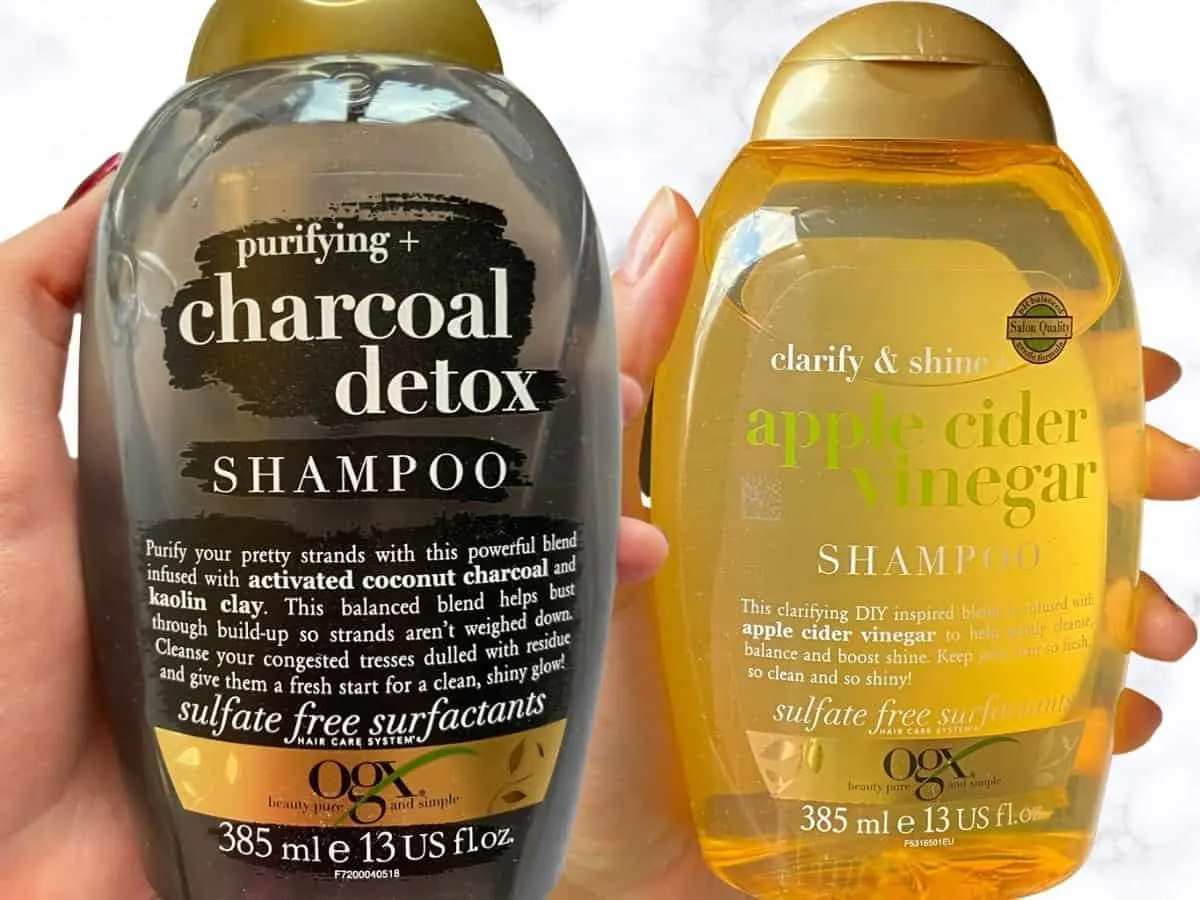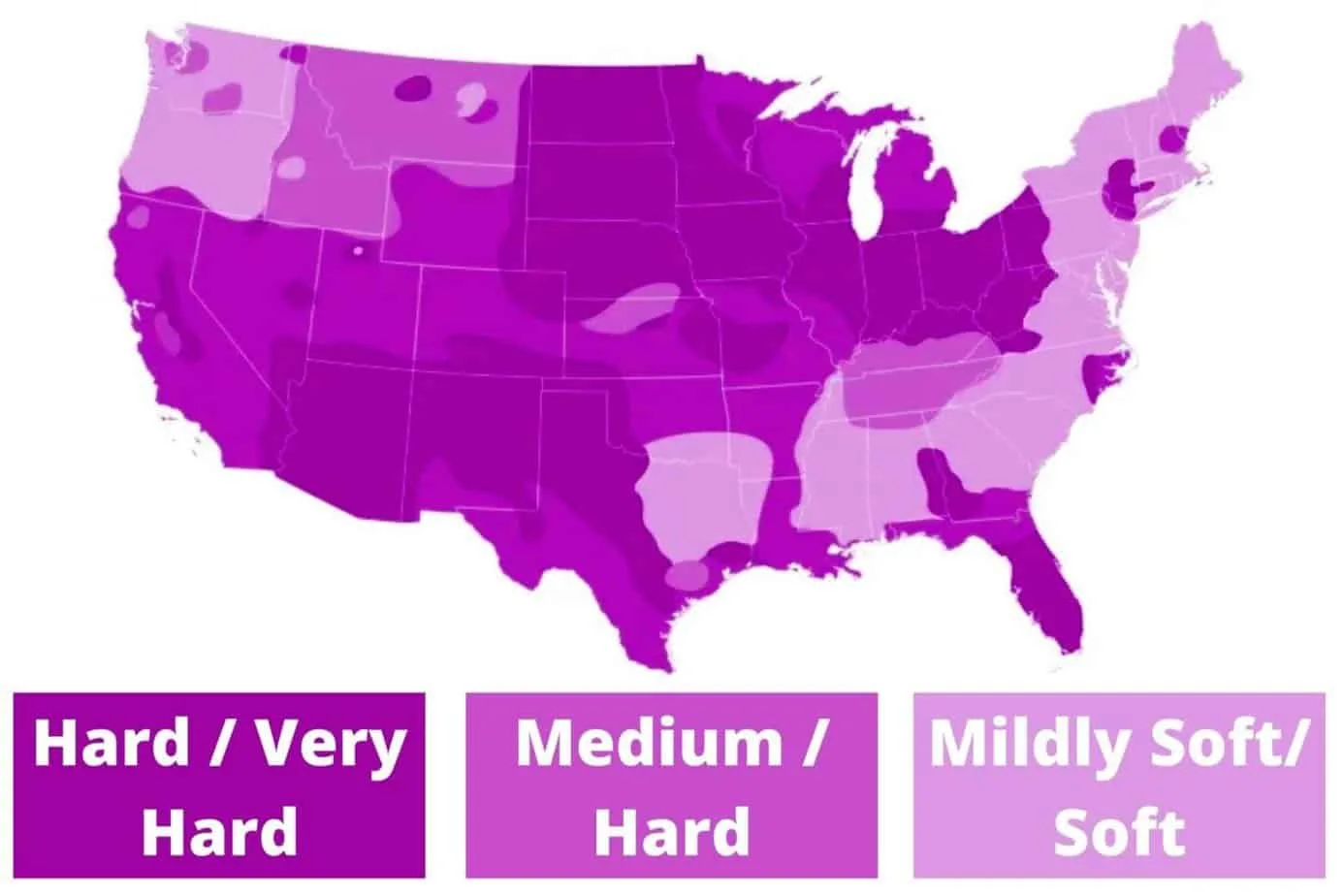Washing your hair regularly in hard water can leave it looking dry and dull over time. This post looks at the signs of hard water on hair, as well as what you can do to protect your hair from water containing a high mineral content.

Signs of Hard Water on Hair
Mineral deposits from hard water can cause a number of negative effects on the hair including dryness and frizz. Over time hard water deposits can also block the hair follicles, weaken the hair shaft, and leave the scalp itchy.
Some of the signs of hard water on the hair include:
- Dryness
- Dullness
- Less Body
- Hair dye fades quickly
- Weak Lather when washing hair
- Difficulty Washing soap out of hair
- Frizzy hair
- Thin and weak hair
- Itchy scalp
What is Hard Water?
Hard water is water which has a high amount of minerals dissolved in it (usually magnesium and calcium).
Hard water forms when rain falls onto porous rock (like chalk or limestone) in the earth. As the water passes through the ground it collects and absorbs minerals from the rocks.
Areas that have non-porous rock, like granite, do not have hard water since the rain water cannot pick up minerals or particles from the ground.
Hard water can be a problem since it causes limescale. It can block your shower head and damage your kettle, dishwasher or washing machine over time.
How Hard Water Effects Your Hair and Scalp
Not only can hard water damage household appliances, but it’s also not great for our hair and skin! The effects of hard water start to appear gradually over time as minerals from the water start to weigh the hair down and dry out the skin. If you regularly dye your hair, hard water can also cause your colour to fade quicker.
One study from 2016 showed that washing your hair in hard water can cause the hair to have a ruffled appearance, and have decreased thickness. Another study from 2018 showed that hair was more likely to become weak and break when it was washed in hard water.
Despite evidence showing that hard water causes the hair to become thin and brittle, I did find another study from 2013 however which proved that hard water did not effect the elasticity of the hair.
How do I Get Rid of Hard Water Build up in my Hair?
In my opinion the best way to protect your hair from the detrimental effects of hard water is to regularly use clarifying hair products.
Clarifying shampoos and natural remedies such as baking soda or apple cider vinegar help to break down mineral deposits, and reduce hair breakage and dryness.
What is a Clarifying Shampoo?
Clarifying shampoos are special shampoos which remove excess grease, product buildup and hard water minerals from the hair. They are used to purify and detox the hair, and leave it shiner and healthier.
I am a big fan of OGX who make two excellent clarifying shampoos:
I explain how to use these products in my post on how to clarify curly hair. In that post there’s also a video which goes through my process for removing mineral buildup from the hair.

There are also shampoos specifically designed for hard water. I have an article on the best shampoo for hard water which includes a comparison table so you can choose the right shampoo for you.
Check out the best daily shampoos for hard water.
How to use an Apple Cider Vinegar Rinse
Apple cider vinegar, and other natural ingredients like lemon juice, help to break down mineral build-up on the hair so it can be easily washed off. You can make your own apple cider vinegar rinse by mixing two tablespoons of apple cider vinegar with two cups of filtered bottled water and rinsing it through your hair.
I normally use the OGX Apple Cider Vinegar rinse (pictured below) since it helps to deeply clean both the hair and scalp. I found this easier than making my only DIY apple cider rinse every time I washed my hair.

How Can I Protect my Hair from Hard Water?
Apart from choosing the right hair care products, there are other things you can do protect your hair and skin from excess minerals in your water. These include installing a water softener, or washing in purified water.
Install a Water Softener
A water softener is a filter that you install in your home. It removes the magnesium and calcium deposits from your water. Water softeners vary in price depending on the size of your home, but they can be expensive. In the UK the average price of a non-electric water softener is £750, and an electric one is £500.
A water softener is a good way to protect your hair and skin from the damaging effects of hard water. Once the hard minerals are removed from your tap water you may notice improved hair texture and less itchy skin.
What About Shower Filters?
Shower head filters can remove chemicals but won’t soften the water. Water softeners work by passing the water over a bed of charged resin beads. These beads are charged with a sodium ions, and the process replaces the magnesium and calcium in the water with sodium. It is not possible for a shower head to do this.
Be aware if you see a claim that a shower head filter will soften hard water, because this is untrue. Shower filters may be able to reduce the amount of calcium and magnesium coming out of the tap, but they won’t soften the water.
Rinse with Purified Bottled Water
If your water source contains excess minerals you could rinse your hair with purified bottled water after you wash it. Using purified water for your final rinse, will help to eliminate soap scum, and prevent a buildup of minerals. This could prevent the hair becoming dull and flat.
This method won’t however prevent your hair from becoming stripped of its natural oils since you are still washing your hair in hard water. If you shower in hard water it will still cause dry skin and frizzy hair even if you do a final rinse with purified water.
Do You Have Hard Water in Your Area?
If you live the UK like me, the chances are you probably live in a hard water area. In the South East of England and London, the amount of minerals dissolved in the water is especially high. Wales and Scotland have much softer water. The map below shows the different levels of water hardness in the UK.

In the United States the areas with the hardest water are New Mexico, Utah, and the western part of Texas. Wisconsin, Indiana, and Florida also have hard water. The map below shows the different levels of water hardness in the United States. The pale coloured areas have soft water.

Other Posts You May Find Useful
I hope this post helped you to to identify the signs of hard water on hair. If you have dry hair or sensitive skin, and are worried about the adverse effects of hard water, you may find the following articles helpful.
- How Much Damage Tap Water Can Really Do To Your Skin, According to Dermatologists
- How to Prevent Hair Loss from Hard Water
- When and How to Use Clarifying Shampoo
This Post Was All About the Signs of Hard Water on Hair
Thank you for reading my post about the signs of hard water on hair. If you have a hard water problem there’s unfortunately no permanent solution. To protect the health of your hair, choose the best shampoos and regularly use an apple cider vinegar or lemon rinse.
